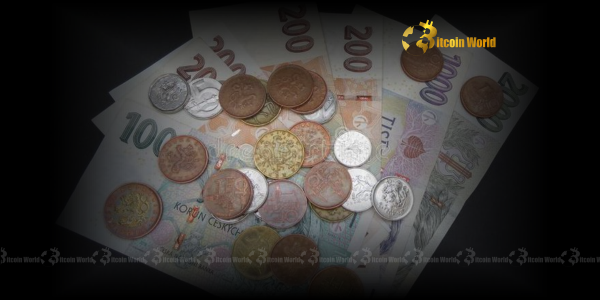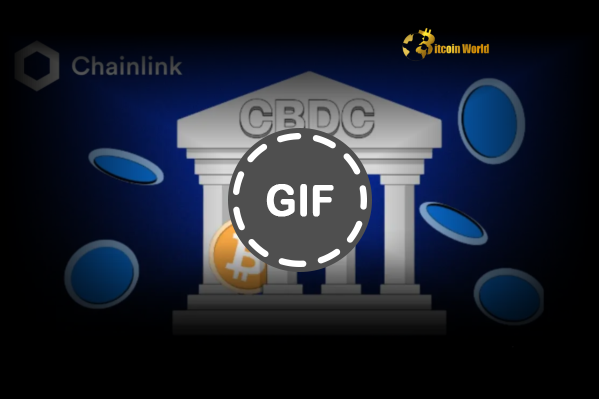BitcoinWorld

Czech Koruna’s Resilient Rally: Why CNB Interest Rates Are Pivotal
For many cryptocurrency enthusiasts, keeping an eye on global macroeconomic trends is just as crucial as tracking Bitcoin’s latest movements. The recent rally of the Czech Koruna offers a compelling case study in how central bank signals can profoundly impact currency markets, creating ripple effects across the broader financial landscape. What’s driving this newfound strength, and what does it mean for investors and the wider economy?
Understanding the Rally: What’s Driving the Czech Koruna?
The strength of the Czech Koruna can be primarily attributed to a significant shift in market expectations regarding the Czech National Bank’s (CNB) future interest rate policy. Earlier this year, market participants largely anticipated a series of aggressive rate cuts from the CNB, aiming to stimulate the economy as inflation seemed to cool. However, recent economic data has painted a different picture, leading to a moderation of these dovish expectations.
- Persistent Inflation: While headline inflation has decreased, core inflation, which excludes volatile items like energy and food, has shown resilience, indicating underlying price pressures. This suggests that inflation might not be falling as rapidly as initially projected.
- Strong Labor Market: The Czech Republic continues to boast a robust labor market with low unemployment rates and rising wages. This wage growth can fuel consumer spending, potentially creating upward pressure on prices.
- Global Economic Stability: A more stable global economic outlook, particularly within the Eurozone, the Czech Republic’s primary trading partner, has reduced the urgency for deep domestic rate cuts.
This revised outlook has led investors to believe that the CNB will maintain its higher interest rates for a longer period than previously thought. Higher rates make a currency more attractive to foreign investors seeking better returns, thereby increasing demand for the Czech Koruna and driving its value up.
CNB Interest Rates: The Core of the Koruna’s Strength
The decisions made by the Czech National Bank regarding its CNB Interest Rates are the linchpin of the Koruna’s current performance. The CNB has adopted a cautious, data-dependent approach, signaling that it will only ease monetary policy when there is clear and sustained evidence that inflation is firmly on a path towards its target.
Historically, central banks use interest rates as a primary tool to manage inflation and economic growth. When inflation is high, raising or maintaining high rates helps to cool down the economy by making borrowing more expensive, thereby reducing spending. Conversely, cutting rates stimulates the economy. The CNB’s current stance reflects its commitment to price stability, even if it means tolerating a stronger currency.
Consider the recent trajectory of the CNB’s benchmark rate. After a period of aggressive hikes to combat surging inflation, the bank has held rates steady, resisting pressure for rapid cuts. This steadfastness has reassured the market that the CNB is serious about its inflation mandate. The expectation that CNB Interest Rates will remain elevated relative to some other developed economies creates a positive carry for investors, further bolstering the Koruna.
The Czech Economy: Navigating Inflation and Growth
The strength of the Czech Koruna has significant implications for the broader Czech Economy. A stronger currency can be a double-edged sword, offering both advantages and challenges.
Benefits for the Czech Economy:
- Lower Import Costs: A stronger Koruna means that imported goods, including raw materials and energy, become cheaper. This directly helps to alleviate inflationary pressures and can reduce costs for businesses.
- Increased Purchasing Power: Czech consumers benefit from a stronger currency as their money can buy more foreign goods and services, including travel abroad.
- Attracting Foreign Investment: Higher interest rates and a stable currency can attract foreign direct investment (FDI) and portfolio investment, providing capital for economic growth and development.
Challenges for the Czech Economy:
- Impact on Exports: A stronger Koruna makes Czech exports more expensive for foreign buyers, potentially reducing their competitiveness in international markets. This is a key concern for the export-oriented Czech economy.
- Tourism Sector: Similarly, a stronger currency can make the Czech Republic a more expensive destination for tourists, potentially affecting the tourism industry.
Despite these challenges, the overall health of the Czech Economy, supported by low unemployment and a resilient domestic demand, provides a buffer. The CNB’s balancing act aims to achieve price stability without unduly harming economic growth.
Navigating the Forex Market: Opportunities and Risks for Traders
For participants in the global Forex Market, the Czech Koruna’s rally presents both opportunities and risks. Currency pairs involving the Koruna, such as EUR/CZK and USD/CZK, have experienced notable movements, reflecting the shifting sentiment.
Opportunities:
- Carry Trade Potential: The relatively higher CNB Interest Rates compared to the Eurozone or the US make the Koruna an attractive currency for carry trades. Investors can borrow in a low-interest currency and invest in the Koruna to earn the interest rate differential.
- Directional Trading: Traders who correctly anticipated the moderation of rate cut expectations have been able to profit from the Koruna’s appreciation.
Risks:
- Sudden Policy Shifts: While the CNB has been consistent, any unexpected shift in its Monetary Policy rhetoric or actual rate decisions could trigger rapid reversals in the Koruna’s value.
- Global Risk Sentiment: As a smaller, open economy, the Koruna can be susceptible to broader shifts in global risk sentiment. During periods of global economic uncertainty, investors often flock to safe-haven currencies, potentially putting downward pressure on emerging market currencies like the Koruna.
- Intervention Risk: Although less likely now, central banks sometimes intervene in currency markets to curb excessive volatility or prevent sharp appreciation/depreciation if it threatens economic stability.
For those engaged in Forex Market trading, it is crucial to closely monitor CNB communications, key economic indicators from the Czech Republic, and global macroeconomic trends to make informed decisions.
Monetary Policy Outlook: What’s Next for the CNB?
The future trajectory of the Czech Koruna will largely depend on the Czech National Bank’s ongoing Monetary Policy decisions. The CNB has consistently emphasized its data-dependent approach, meaning that future rate adjustments will be dictated by the evolution of inflation, wage growth, and the overall economic environment.
Several scenarios could unfold for the CNB’s Monetary Policy in the coming months:
- Gradual Cuts: If inflation continues its downward trend and approaches the CNB’s target, the bank may embark on a series of gradual rate cuts to support economic activity. These cuts are likely to be cautious and measured, reflecting the bank’s prudence.
- Prolonged Hold: Should inflation prove stickier than expected, or if global economic conditions deteriorate, the CNB might opt to hold rates at their current levels for an extended period, prioritizing price stability over growth stimulation.
- External Factors: Significant changes in the European Central Bank’s (ECB) policy or major geopolitical events could also influence the CNB’s decisions, potentially forcing it to adapt its stance to maintain stability.
The CNB’s primary objective remains achieving and maintaining price stability. Its cautious approach to easing Monetary Policy is a testament to this commitment, aiming to ensure that the Koruna’s stability is built on solid economic fundamentals.
Challenges and Considerations for Investors
While the Czech Koruna‘s rally highlights the power of central bank policy, investors should remain aware of inherent challenges. Currency markets are inherently volatile, influenced by a myriad of factors from economic data releases to geopolitical events. For cryptocurrency investors, understanding these macro shifts is vital, as they can indirectly impact capital flows and risk appetite across all asset classes, including digital assets. A stable traditional financial environment, partly underpinned by strong currencies, can foster broader confidence, which in turn might influence how capital is allocated across the investment spectrum.
Conclusion: What Lies Ahead for the Koruna?
The recent rally of the Czech Koruna is a clear indicator that market expectations around CNB Interest Rates have fundamentally shifted. The moderation of aggressive rate cut anticipations, driven by persistent inflation and a resilient Czech Economy, has provided significant tailwinds for the currency. For participants in the Forex Market, this presents both opportunities and challenges, demanding careful attention to the CNB’s ongoing Monetary Policy signals.
As the Czech National Bank continues its delicate balancing act between combating inflation and supporting economic growth, the Koruna’s trajectory will remain a fascinating watch. Its resilience underscores the importance of central bank credibility and the nuanced interplay of economic data in shaping currency valuations. Investors and analysts alike will be keenly observing future CNB statements and economic releases to gauge the Koruna’s next move, cementing its position as a key currency to monitor in the global financial landscape.
To learn more about the latest Forex market trends, explore our article on key developments shaping interest rates and global liquidity.
This post Czech Koruna’s Resilient Rally: Why CNB Interest Rates Are Pivotal first appeared on BitcoinWorld and is written by Editorial Team





